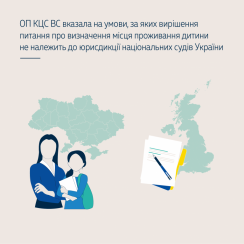Contact center of the Ukrainian Judiciary 044 207-35-46

If there is an unexecuted foreign court decision on the return of a child and the competent authority of the state to which the child is to be returned has not consented to the jurisdiction of the national courts of Ukraine, the issue of determining the child's place of residence does not fall within the jurisdiction of the national courts of Ukraine. If such circumstances are established by a court of Ukraine during the consideration of a case concerning the determination of the child's place of residence, the proceedings in such a case shall be terminated in accordance with paragraph 1, part 1, Article 255 of the Civil Procedural Code of Ukraine.
These legal conclusions, which ensure the uniformity of case law, were reached by the Joint Chamber of the Civil Cassation Court of the Supreme Court.
In the circumstances of the case, the plaintiff and her husband moved to the United Kingdom after their marriage, where they had a child. The relationship between the spouses deteriorated, and in August 2018, the plaintiff and her daughter left for Ukraine. In September of that year, she filed a lawsuit with the Poltava District Court of Poltava Region to determine the child's place of residence with her.
After repeatedly reviewing the case, the court of appeal upheld the decision of the first instance court to satisfy the claim. The court stated that the question of whether the child had become accustomed to his or her place of residence, i.e. whether it had become permanent and habitual, was, in this case, subject to establishment on the ground that it was decisive for the determination of jurisdiction over the dispute. Such circumstances must be assessed in relation to the best interests of the child, both now and in the future. The child lived in the UK from birth to the age of 1.2 years and in Ukraine for 4 years and 7 months. In assessing the 'habitual' or 'permanent' nature of a place of residence, the most relevant period of time elapsed and the characteristics of the child's age are relevant.
Having concluded that Ukraine was the child's habitual residence, the court of appeal held that the dispute over the child's place of residence fell within the jurisdiction of the Ukrainian courts.
The Joint Chamber of the Civil Cassation Court of the Supreme Court overturned the previous judgments and closed the proceedings in the case, stating the following.
During the hearing of the case, the court heard that there were decisions from the Portsmouth Family Court and the Croydon Family Court, made in June and July 2017, which prohibited the mother (the plaintiff) from taking her child out of England and Wales.
The father filed a petition with the authorities to secure the child's return, and in September 2019, the Poltava Court of Appeal, whose decision was upheld by the Civil Cassation Court of the Supreme Court, declared the mother's (the plaintiff's) removal and retention of the child in Ukraine unlawful and ordered the child's return to the United Kingdom of Great Britain and Northern Ireland.
The jurisdiction of Ukrainian courts in cases with a foreign element is established at the moment of commencement of the proceedings, even if the grounds for such jurisdiction disappear or change during the proceedings (part 1 of Article 75 of the Law of Ukraine "On Private International Law").
The Joint Chamber of the Civil Cassation Court analysed clause (b) of part 1 of Article 7 of the Convention on Jurisdiction, Applicable Law, Recognition, Enforcement and Co-operation in respect of Parental Responsibility and Measures for the Protection of Children (Hague Convention on Parental Responsibility, 1996), according to which the jurisdiction of the state of the child's habitual residence ceases when the child acquires a new permanent (habitual) residence in another country.
In order to terminate the jurisdiction of such a state, the following conditions must be met: a) the child has lived in another state for at least one year; b) no request for the child's return has been made during this period; c) the child has adapted to the new environment. The jurisdiction of a state is terminated upon fulfilment of these conditions in their entirety.
The Joint Chamber of the Civil Cassation Court of the Supreme Court concluded that if there is a court decision on the return of a child in accordance with the provisions of the Hague Convention of 1980, which has entered into force but remains unexecuted, and if there is no consent of the competent authority of the foreign state to which the child is to be returned in accordance with the Hague Convention on Parental Responsibility of 1996 to the exercise of jurisdiction by the national courts of Ukraine, the decision on determining the child's place of residence does not fall within the jurisdiction of the national courts of Ukraine, and if the above circumstances are established during the consideration of a civil case, the proceedings shall be closed pursuant to clause 1, part 1, Article 255 of the Civil Procedural Code of Ukraine.
The Resolution of the Supreme Court of 18 September 2023 in case No. 545/2247/18 (proceedings No. 61-6421сво23) - https://reyestr.court.gov.ua/Review/113626621.
This and other legal positions of the Supreme Court can be found in the Database of Legal Positions of the Supreme Court - lpd.court.gov.ua/login.